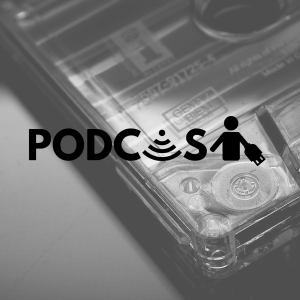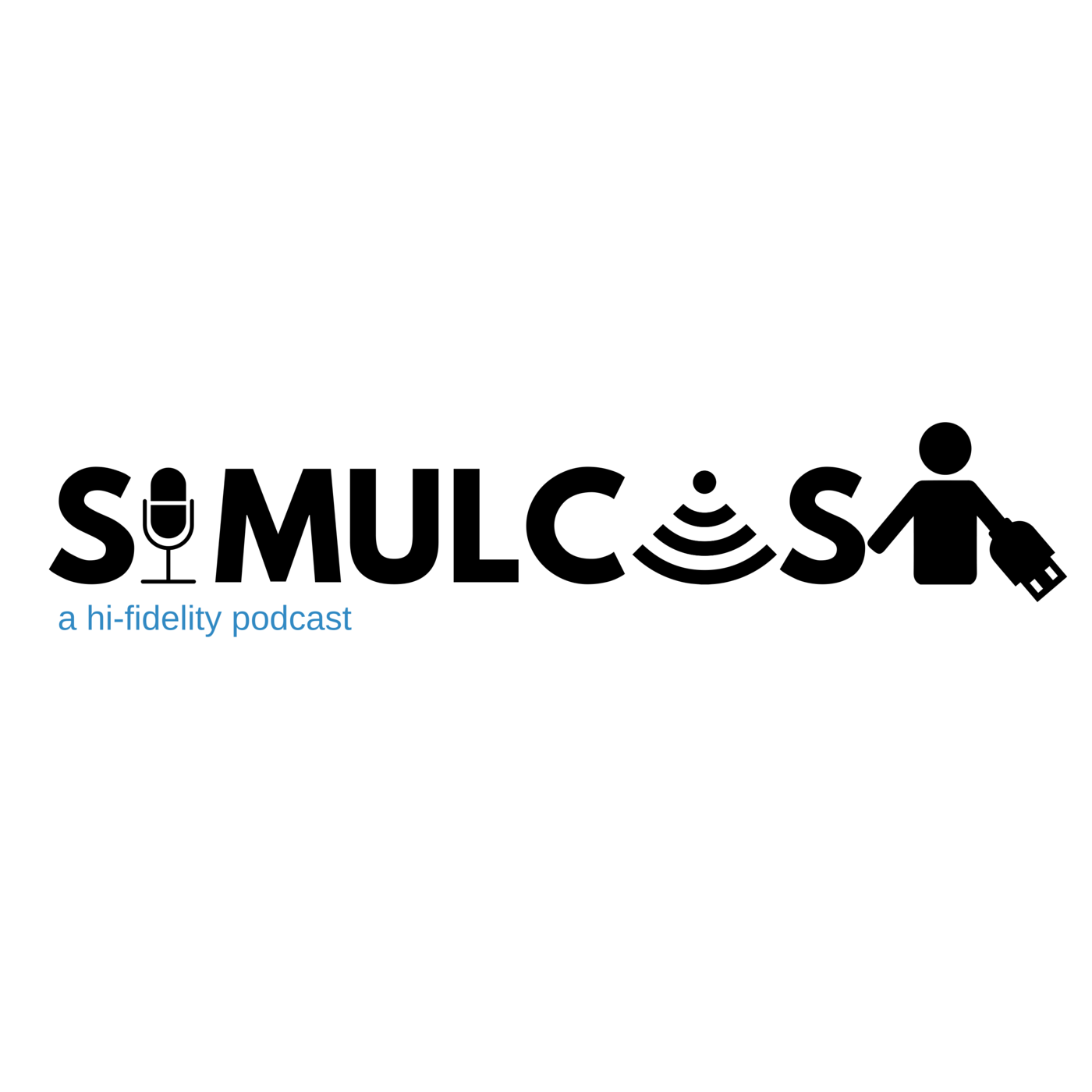Episodes

Friday Mar 20, 2020
98 - Lessons Learned in Sim and Education: A Montage of Friends of Simulcast
Friday Mar 20, 2020
Friday Mar 20, 2020
IN this episode, we’ve asked five of our simulation colleagues to tell us what they’re doing, what they’ve found and any advice they might have for others as they work with their clinical colleagues on this challenge.
In this episode you’ll hear from:
Albert Chan (@gaseousXchange) from Hong Kong , with a great airway management infographic
Andrew Petrosoniak (@petrosoniak) from Toronto, Canada
Tim Willett (@SIMtim_one), also from Canada www.SIM-ONE.ca
James Leung (@drjscleung), from Mc Master, Ontario Canada
Christine Park (@cpark_stories) from Chicago
- The Whats app group https://chat.whatsapp.com/LVy0T1dWvan9enqMDwElRN
- The Google drive https://drive.google.com/drive/folders/1kDrTZ0mlFgug7RfoIocZ09Crj24py8z2
Please be in touch if you’d like to tell your COVID simulation stories

Monday Mar 16, 2020
97 - COVID-19 Sim
Monday Mar 16, 2020
Monday Mar 16, 2020
COVID19 will be challenging for healthcare providers and communities around the world. Simulation providers are helping and targeting the various challenges we anticipate.
In this episode Vic welcomes Jess Stokes-Parish to the team, and introduces the Simulcast page we’ve set up for sharing and curating resources for simulation providers
They also discuss their personal experience so far with simulation preparation for COVID, and the strategies we’ve seen emerging around the world.
More to come on #COVIDsim soon….

Monday Mar 02, 2020
96 - Journal Club Podcast Feb 2020: Virtual Communities of Practice
Monday Mar 02, 2020
Monday Mar 02, 2020
Finding our (sim) people in a globally connected world – Virtual Communities of Practice
How do we find our simulation friends online? What supports the formation and nurturing of these professional groups? This month Ben and Vic discuss the paper of the month…..
We explore what that means, and consider some examples Our expert commentator @andrewjtagg offers his experience with https://dontforgetthebubbles.com/
For more great listening on CoP in health professions education – listen here
We continued the CoP theme in looking at :-
Pritchard, Shane A. BPhysio; Denning, Tracy MOsteo; Keating, Jennifer L. PhD; Blackstock, Felicity C. PhD; Nestel, Debra PhD Simulation in Healthcare: February 2020 - Volume 15 - Issue 1 - p 21-29
And Ben’s own…
Twigg S, Ardila Sarmiento MC, Lawton B, et al. Optimus BONUS: open access simulation-based education packages on paediatric resuscitation using spaced repetition and deliberate practice. BMJ Simulation and Technology Enhanced Learning Published Online First: 09 January 2020. doi: 10.1136/bmjstel-2019-000536
More on the packages here https://dontforgetthebubbles.com/practice-made-perfect/
And finally …… coronavirus sim…. of course…… Who says a mannikin can’t sneeze….?
https://emsimcases.com/2020/02/18/suspected-covid-19/
Look forward to next month!
Vic and Ben

Wednesday Feb 26, 2020
95 - Book Review - Healthcare Simulation Research - A Practical Guide
Wednesday Feb 26, 2020
Wednesday Feb 26, 2020
Looking for that next step in your healthcare simulation research journey?
In this episode, Vic reviews Healthcare Simulation Research - A Practical Guide with two of the editors -Debra Nestel and Aaron Calhoun.
This book covers a vast array of research topics, with 48 chapters written by experts in their fields, with practical advice for researchers at all levels. Aaron and Debra describe what’s in the book and how to read it. They offer their own reflections on the writing and what they learnt in the process, as well as some thoughts about where the field is heading in the future.
There are tips for beginners and experts, as well as Debra introducing us to ‘theoretical connoisseurship’ 😊
Healthcare Simulation Research - A Practical Guide by Debra Nestel, Joshua Hui, Kevin Kunkler, Mark W. Scerbo and Aaron W. Calhoun (eds)

Monday Dec 23, 2019
94 - Journal Club Monthly Wrap Podcast November/December 2019
Monday Dec 23, 2019
Monday Dec 23, 2019
Ben and Vic discuss the paper of the month and consider the learning impact for active participants versus observers in sim. Vic stumbles her way through explaining a meta-analysis…
Delisle, M., Ward, M., Pradarelli, J., Panda, N., Howard, J. and Hannenberg, A. (2019). Comparing the Learning Effectiveness of Healthcare Simulation in the Observer Versus Active Role. Simulation in Healthcare: Simulation in Healthcare, 14(5), pp.318-332.
We continued the theme of ‘methods and metrics’ and considered a Delphi study used to develop an evaluation tool for scenarios
Hernandez J, Frallicciardi A, Nadir N, et al. Development of a Simulation Scenario Evaluation Tool (SSET): modified Delphi study. BMJ Simulation and Technology Enhanced Learning Published Online First: 13 December 2019.
And considered a proposed adjunct to the description phase of debriefing
Secheresse, T., Nonglaton, S. The “Timeline Debriefing Tool”: a tool for structuring the debriefing description phase. Adv Simul 4, 29 (2019)
And in the Christmas spirit – Ben trialled a Santa Simulator from roblox… compete against him if you dare….
https://www.roblox.com/games/2596675282/Santa-Simulator
Join the discussion at www.simulationpodcast.com
Victoria

Wednesday Dec 11, 2019
93 - What Does Learning Look Like? With Jen Keast.
Wednesday Dec 11, 2019
Wednesday Dec 11, 2019
Vic interviews Jen Keast (@jenkeastsim) about her PhD work on developing Medical Students’ Acute Patient Management Skills. They take a deep dive into how theory informs teaching practice for students – cognitive load, flow theory, and more. Jen explains the role of ‘in game coaching’ and how to design longitudinal curriculum. And if you’re thinking about doing a PhD .. there’s some inspiration here.

Friday Nov 29, 2019
92 - Journal Club Monthly Wrap Podcast October 2019
Friday Nov 29, 2019
Friday Nov 29, 2019
Ben and Vic discuss the paper of the month and all things clinical event debriefing with our expert commentator Dr Laura Rock (@laurakanerock)
Rose, M. and Rose, K. (2018). Use of a Surgical Debriefing Checklist to Achieve Higher Value Health Care. American Journal of Medical Quality, 33(5), pp.514-522.
We also reviewed an interesting conceptual paper on self regulated learning (SRL) and simulation.
Shariff, F. Hatala, R. Regehr,G Learning After the Simulation Is Over: The Role of Simulation in Supporting Ongoing Self-Regulated Learning in Practice. Academic Medicine. Publish Ahead of Print:, NOVEMBER 12, 2019
And Ben introduced the paper for next month, reviewing the value observer roles in sim
Delisle, M., Ward, M., Pradarelli, J., Panda, N., Howard, J. and Hannenberg, A. (2019). Comparing the Learning Effectiveness of Healthcare Simulation in the Observer Versus Active Role. Simulation in Healthcare: Simulation in Healthcare, 14(5), pp.318-332.
So we’ll be back in December with our wrap
Join the discussion at www.simulationpodcast.com
Victoria

Sunday Nov 03, 2019
91 - Advances in Simulation: Sim for clinical systems and facilities testing
Sunday Nov 03, 2019
Sunday Nov 03, 2019
n the latest instalment of our Advances in Simulation (@AdvinSimulation) series, Vic was joined by Nora Colman (@noracolman) and Sue Barnes to discuss how simulation can be used to plan and test new healthcare facilities and systems.
They each brought immense personal experience to their publications, and we discussed ways to smooth the paths for others with similar challenges. We talked about key steps in stakeholder collaboration, needs assessment, scenario planning and delivery, debriefing, and reporting
The papers:-
Nora Colman, Cara Doughty, Jennifer Arnold, Kimberly Stone, Jennifer Reid, Ashley Dalpiaz & Kiran B. Hebbar. Simulation-based clinical systems testing for healthcare spaces: from intake through implementation. Advances in Simulation volume 4, Article number: 19 (2019)
Alyshah Kaba & Sue Barnes. Commissioning simulations to test new healthcare facilities: a proactive and innovative approach to healthcare system safety. Advances in Simulation volume 4, Article number: 17 (2019)

Monday Oct 28, 2019
90 - Simulcast ASC19 Montage
Monday Oct 28, 2019
Monday Oct 28, 2019
We share some highlights of the #SimCongress19 held on the Gold Coast, Australia. The episode includes thoughtful reflections from our own Ben Symon, an interview with Tash Yates (@DrTashY) about simulation to shape resilience in medical students, and Ian Summers (@IanMeducator) on the conference highlights.
Thinking about conferences in 2020? Some links to the events Vic described at the end
IMSH San Diego Jan 18-22, 2020. http://imsh2020.org/
SEAM Milan 17-19th June. https://www.sesam-web.org/events/event/sesam-milan-2020/
NZASH Christchurch 6-7th November. https://nzash.co.nz/

Tuesday Oct 15, 2019
89 - Journal Club Podcast Monthly Wrap September 2018
Tuesday Oct 15, 2019
Tuesday Oct 15, 2019
Simulcast Journal Club podcast September 2019 episode
Ben and Vic discuss the paper of the month,
Kolbe, M., Eppich, W., Rudolph, J., Meguerdichian, M., Catena, H., Cripps, A., Grant, V. and Cheng, A. (2019). Managing psychological safety in debriefings: a dynamic balancing act. BMJ Simulation and Technology Enhanced Learning, pp.bmjstel-2019-000470.
Ng, S., Kangasjarvi, E., Lorello, G., Nemoy, L. and Brydges, R. (2019). ‘There shouldn't be anything wrong with not knowing’: epistemologies in simulation. Medical Education.
We also discussed 2 other papers on peer debriefing and using sim to embed surgical safety checklists
Solanki P, Angel D, Foster A Peer group high-fidelity simulation debriefing for final year medical students BMJ Simulation and Technology Enhanced Learning 2019;5:225-226.
Zaffry Z, Jaye P, Laws-Chapman C, et al. Safer surgery through simulation: increasing compliance with the 5 Steps to Safer Surgery through an in-situ simulation based training programme at Guy’s and St Thomas’ NHS Foundation Trust BMJ Simulation and Technology Enhanced Learning 2019;5:196-197.
And Ben introduced the papers for August

Rose, M. and Rose, K. (2018). Use of a Surgical Debriefing Checklist to Achieve Higher Value Health Care. American Journal of Medical Quality, 33(5), pp.514-522.
So we’ll be back in November with our wrap
Join the discussion at www.simulationpodcast.com
Victoria

